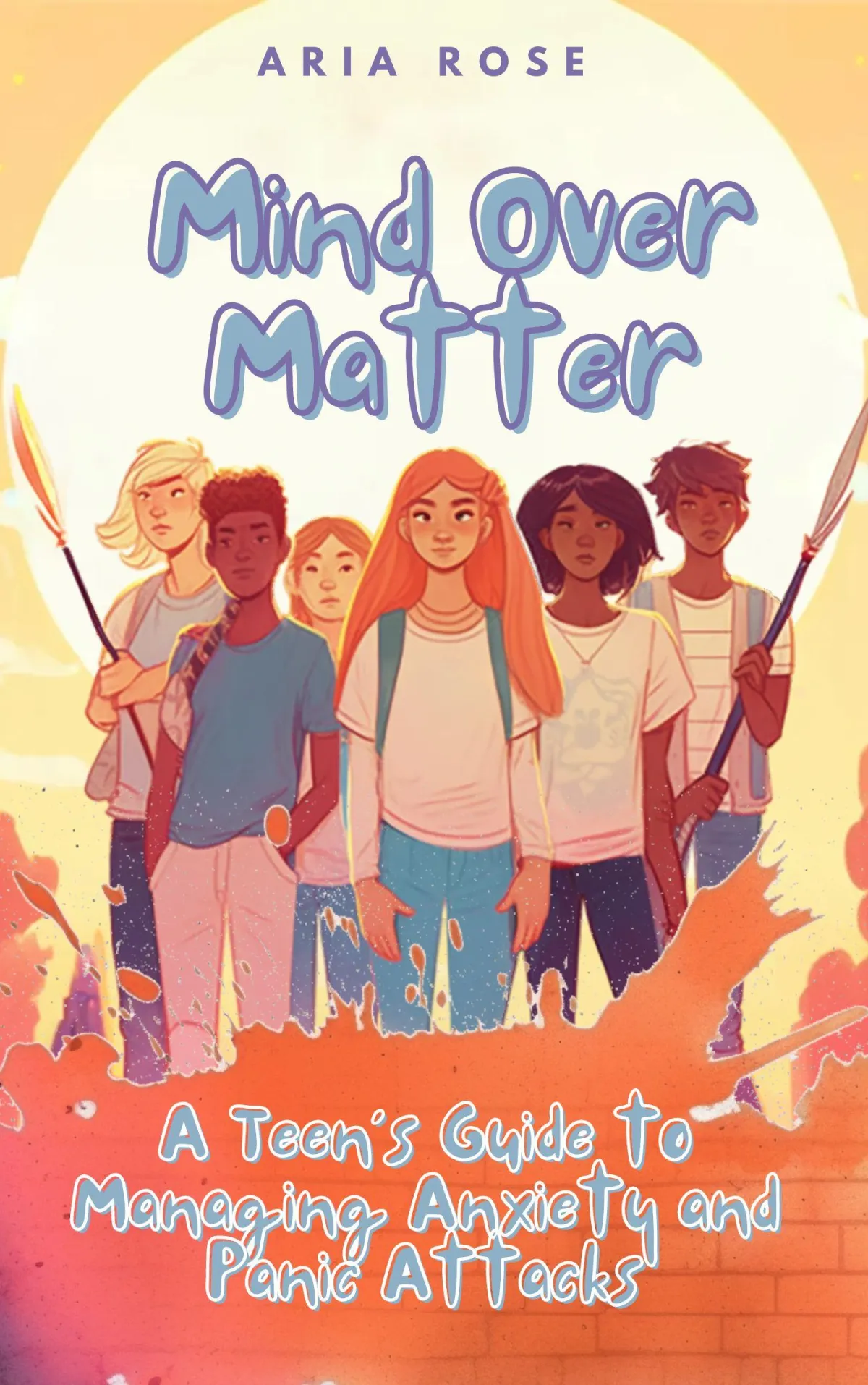Transform Your Mind
with the 'Calm Mind' Newsletter
Join our journey at A Peaceful Tomorrow, where we guide young adults and teenagers to a life of resilience, self-confidence, and mental well-being.
“I LOVE This Newsletter! I'm learning more about myself with each one!

Recent Posts

Everything you must need to know about teen anxiety disorder: 8 self-help strategies to manage anxiety disorder (No. 3 will surprise you!)
Content:
Introduction
How common is anxiety disorder in teenagers?
Types of anxiety disorders
Causes and risk factors of anxiety disorders
Signs and symptoms of anxiety disorders
Treatment options for anxiety disorders
8 Self-help strategies for managing anxiety
Support resources for individuals with anxiety disorders
How family and friends can provide support to teens with anxiety disorder?
Conclusion: Seeking help and finding hope
“To be relevant as a nation in this twenty-first century, youths must be empowered in such a way that no obstacle can stand in their way.” ― Bamigboye Olurotimi. This quote shows that youths like you are vital to society in shaping and developing the community. It would be best if you were equipped and supported in a manner that allows you to surmount any barriers or challenges hindering your progress. You may face “obstacle” during your teenage years, which includes mental health issues. In this article, we will discuss a specific mental issue you possibly encounter – anxiety disorder.
The teenage years are a period of transition to adolescence where teens like you will likely face fresh and new challenges, experiences, and opportunities. Due to unfamiliarity, you will sense an overwhelming feeling that makes you worry about many things. This feeling can help you take action. For example, you are worried about passing an exam, so you study your lessons and join group discussions with your classmates. This anxious feeling is a normal response to challenging and threatening situations. But when anxiety goes beyond even without the presence of a threat or interferes with your daily activities, you may have an anxiety disorder.
How common is anxiety disorder in teenagers?
In a comprehensive survey conducted by Dr Kathleen Ries Merikangas and a team of researchers published in 2010, anxiety disorders emerged as the prevailing condition among adolescents in the continental U.S., affecting 31.9% of the 10,123 surveyed individuals aged 13 to 18 years. As a result, about one in every 4–5 youth in the U.S. fills the criteria for a mental disorder that seriously affects them for the rest of their lives.
Anxiety disorders are more than just occasional worrying; they are persistent and can interfere with daily life. Whether you are personally affected by anxiety or know someone who is, this article aims to provide valuable insights and practical tips for navigating anxiety disorders.
Types of anxiety disorders
Anxiety disorders encompass a range of conditions that can affect individuals differently. Understanding the different types of anxiety disorders is crucial for identifying symptoms and seeking appropriate help.
Generalized Anxiety Disorder (GAD)
GAD is a type of anxiety that makes teens feel excessive worry and anxiety about many things. Individuals with GAD often struggle to control their worries, leading to physical symptoms such as muscle tension, fatigue, and irritability. These are the things that you constantly worry if you have GAD:
Events to come
School works
Making mistakes
Gaining someone’s approval
What you did in the past
Physical appearance
Personal abilities
Family matters and expectations
Panic Disorder
Based on the article “Adolescents’ Lived Experience of Panic Disorder: An Interpretative Phenomenological Analysis” by Holly J. Baker, Amelia Hollywood & Polly Waite (2022), around 1 to 3% of adolescents have panic disorder. Panic disorder is characterized by recurring episodes of intense fear or discomfort accompanied by physical symptoms like rapid heartbeat, shortness of breath, and dizziness. Panic attacks can cause harm, and you may avoid certain situations or places where you fear having an attack. For example, suppose you have excessive worry about your school performance, leading to panic disorder. In that case, you will likely be isolated from school activities and refuse to attend school.
Social Anxiety Disorder
Social anxiety disorder, also known as social phobia, involves an intense fear of social situations and a fear of being judged or embarrassed in front of others. Individuals with social anxiety may avoid social interactions, leading to isolation and difficulty in forming relationships. Its behavioral symptoms include difficulty having conversations, self-consciousness, avoidance of social gatherings, and excessive self-judgment.
Specific Phobias:
An intense fear of specific objects, situations, or activities characterizes specific phobias. This extreme fear causes you to feel that the danger is real, even if there’s no harm. These phobias may result in avoidance of situations that can trigger your phobia. You might avoid going to amusement parks or high-rise buildings if you fear heights. You will avoid swimming pools and beaches if you have a water phobia. These are the common phobias that prevail in teens:
Acrophobia—fear of heights
Agoraphobia—fear of open places
Aquaphobia—fear of water
Arachnophobia—fear of spiders, scorpions, and other arachnids
Astraphobia—fear of storms
Claustrophobia—fear of enclosed spaces
Cynophobia—fear of dogs
Hemophobia—fear of blood
Iatrophobia—fear of doctors
Mysophobia—fear of germs
Ophidiophobia—fear of snakes
Trypanophobia—fear of injections
Obsessive-Compulsive Disorder (OCD)OCD is a chronic mental health condition characterized by uncontrollable and intrusive thoughts (obsessions) and repetitive behaviors (compulsions). Individuals with OCD often engage in rituals or behaviors to alleviate their anxiety but may find temporary relief before the obsessions resurface.
Post-Traumatic Stress Disorder (PTSD)
PTSD can develop after experiencing or witnessing a traumatic event. Symptoms may include flashbacks, nightmares, hypervigilance, and avoidance of reminders related to the traumatic experience.
These are just a few examples of the most common anxiety disorders. It’s important to note that individuals can experience a combination of anxiety disorders or have symptoms that do not fit neatly into one category. Understanding the specific type of anxiety disorder is essential for tailoring treatment and support.
Causes and risk factors of anxiety disordersAnxiety disorders can arise from a combination of genetic, environmental, and psychological factors. While the exact causes are not fully understood, several risk factors have been identified. Here is the list of causes and risk factors affecting teenage anxiety disorders.
Genetics and Family History
If you have a close relative with an anxiety disorder, you may be at a higher risk of developing one yourself. However, genetics alone do not determine the development of an anxiety disorder, and other factors come into play.
Brain Chemistry and Imbalances
Neurotransmitters, such as serotonin and gamma-aminobutyric acid (GABA), play a role in regulating mood and anxiety. An imbalance in these neurotransmitters or other brain chemicals may contribute to the development of anxiety disorders. As a result, you seem to appear to be angry, depressed, or worried at times.
Environmental Factors
Traumatic experiences, such as abuse, neglect, or witnessing violence, can increase the risk of developing an anxiety disorder. Chronic stress, significant life changes, or ongoing stressful situations can also contribute to the development of anxiety.
Personality Traits
Certain personality traits, such as being shy, perfectionistic, or having a tendency towards negative thinking, may increase the likelihood of developing an anxiety disorder.
Drugs or alcohol
Drugs and alcohol disrupt chemical messaging processes in your brain as they slow down the central nervous system, causing harm to the way you think, feel, and behave. You might act aggressively, unmotivated, moody, and depressed.
High expectations from parents and teachers
Some parents and teachers set unrealistic expectations, causing you to feel much stress and pressure. They might expect you to do well in school and enter a prestigious university. They may push you to pursue a career they want you to achieve. Pressure also arises from expectations to excel in arts, music, and sports activities. Every time you do not meet their expectations, it will cause you to lack motivation and confidence.
Peer pressure
You might want to fit in with your classmates, teammates, and co-workers. To be socially accepted, you might do wrong things or commit a crime. According to an article made by Elizabeth Hartney (2022) entitled “What Is Peer Pressure? Types, Examples, and How to Deal with Peer Pressure,” here are examples of teens doing peer pressure:
Acting aggressively (common among men)
Bullying others
Doing drugs
Dressing a certain way
Drinking alcohol
Engaging in vandalism or other criminal activities
Having sex
Physically fighting
Only socializing with a particular group
Signs and symptoms of anxiety disorders
While the specific symptoms may vary depending on the type of anxiety disorder, some common signs to look out for include:
Excessive worry about various aspects of life.
Restlessness
Difficulty concentrating on tasks.
Physical Symptoms include muscle tension, nausea, insomnia, headaches, stomachaches, or fatigue.
Sleep Problems
Irritability or having a short temper.
Avoidance Behaviors.
Repetitive behaviors or rituals
Seeking reassurance
Social isolation
Eating disorder
Treatment options for anxiety disorders
Fortunately, there are effective treatment options available for managing and reducing anxiety symptoms. The choice of treatment will depend on the type and severity of the anxiety disorder, as well as individual preferences and circumstances. Some standard treatment options include:
Psychotherapy: Psychotherapy, also known as talk therapy, is a standard and effective
treatment for anxiety disorders. Cognitive-behavioral therapy (CBT) is a specific type of psychotherapy that helps individuals identify and change negative thought patterns and behaviors that contribute to anxiety. Other forms of therapy, such as exposure therapy and acceptance and commitment therapy (ACT), may also be beneficial.
Medications: In some cases, medications may be prescribed to manage anxiety symptoms. Antidepressants, such as selective serotonin reuptake inhibitors (SSRIs) and benzodiazepines, may be used to alleviate symptoms. Working closely with a healthcare professional is essential to determine the appropriate medication and dosage.
Lifestyle Changes: Making positive lifestyle changes can significantly impact managing anxiety. Regular exercise, adequate sleep, a healthy diet, and stress management techniques like mindfulness or relaxation exercises can help reduce anxiety symptoms.
Support Groups: Joining a support group or seeking support from peers who understand the challenges of living with anxiety can be immensely helpful. Support groups provide a safe space to share experiences, learn coping strategies, and gain emotional support.
Alternative Therapies: Some individuals find relief from anxiety symptoms through alternative therapies, such as acupuncture, yoga, or herbal supplements. It’s essential to consult a healthcare professional before trying alternative therapies to ensure their safety and effectiveness.
8 Self-help strategies for managing anxiety
In addition to professional treatment, there are several self-help strategies that individuals can incorporate into their daily lives to manage anxiety. These strategies can complement formal treatment and give individuals a sense of empowerment and control. Some self-help strategies for managing anxiety include:
Educate Yourself. Learn more about anxiety disorders and understand the specific type you are dealing with. Knowledge is power, and understanding the condition can help reduce fear and uncertainty.
Practice Relaxation Techniques. Incorporate relaxation techniques such as deep breathing exercises, progressive muscle relaxation, or mindfulness meditation into your daily routine. These techniques can help calm the mind and body during moments of anxiety.
Challenge Negative Thoughts. Identify and challenge negative or irrational thoughts that contribute to anxiety. Replace them with more realistic and positive thoughts. You can say to yourself, “I’m in control,” while doing breathing exercises.
Establish a Routine. Establishing a daily routine can provide structure and stability, reducing feelings of unpredictability and anxiety.
Limit Stressors. Identify and limit sources of stress in your life. This may involve setting boundaries, delegating tasks, or making lifestyle changes to prioritize self-care.
Engage in Regular Exercise. Exercise can reduce anxiety by releasing endorphins, improving mood, and promoting overall well-being. Find activities you enjoy and incorporate them into your routine.
Practice Self-Care. Prioritize self-care activities that bring you joy and relaxation. This can include hobbies, spending time with loved ones, or engaging in activities that help you unwind.
Manage Your Environment. Create a calm and soothing environment that promotes relaxation. This may involve decluttering your space, incorporating soothing scents or sounds, or creating a designated relaxation area.
Remember that self-help strategies may not be sufficient on their own for managing severe anxiety disorders. It’s essential to seek professional help and combine self-help strategies with formal treatment for optimal results.
Support resources for individuals with anxiety disorders
Living with anxiety can be challenging, but there are numerous support resources available to help individuals navigate their journey towards recovery. Some valuable resources include:
Mental Health Organizations: Organizations such as the National Alliance on Mental Illness (NAMI) or the Anxiety and Depression Association of America (ADAA) provide information, support, and resources for individuals with anxiety disorders.
Online Communities: Joining online communities or forums dedicated to anxiety disorders can provide a sense of connection, support, and shared experiences.
Therapist Directories: Online directories, such as Psychology Today or GoodTherapy, can help individuals find qualified therapists specializing in anxiety disorders in their area.
Helplines and Hotlines: Helplines and hotlines, such as the National Suicide Prevention Lifeline, offer support and assistance to individuals in crisis or need of immediate help.
Books and Literature: Numerous books and literature are available that provide insights, coping strategies, and personal stories related to anxiety disorders. Some popular titles include “The Anxiety and Phobia Workbook” by Edmund J. Bourne and “My Age of Anxiety” by Scott Stossel.
Exploring these resources and finding the ones that resonate with individual needs and preferences is essential. Remember that seeking support is not a sign of weakness but a courageous step towards better mental health.
How family and friends can provide support to teens with anxiety disorder?
Support from family and friends plays a crucial role in the recovery and well-being of individuals with anxiety disorders. Here are some tips for supporting a loved one with an anxiety disorder:
Educate Yourself: Learn about anxiety disorders to better understand your loved one’s experiences and challenges. This will help you provide empathetic support.
Be Patient: Anxiety disorders can be unpredictable and may cause your loved one to cancel plans or avoid certain situations. Be patient and understanding, and avoid pressuring them to confront their fears before they are ready.
Listen and Validate:
Create a safe space for your loved one to express their feelings and concerns.
Listen without judgment and validate their experiences.
Avoid dismissing their anxiety or telling them to “just relax.”
Offer Practical Support: Offer practical support, such as helping with household tasks, accompanying them to appointments, or researching treatment options. Small gestures can make a big difference.
Encourage Treatment: Encourage your loved one to seek professional help and support them throughout their treatment journey. Offer to accompany them to appointments or help them find suitable healthcare professionals.
Practice Self-Care: Supporting a loved one with an anxiety disorder can be emotionally demanding. Take care of your well-being and seek support for yourself when needed.
Remember that every individual’s journey with anxiety is unique, and support should be tailored to their specific needs and preferences. Open communication, empathy, and understanding foster a supportive environment.
Conclusion: Seeking help and finding hope
Like Bamigboye Olurotimi said, youths like you must be empowered to play a role in shaping society. It means that you are involved in the decision-making of a community. And to unleash your qualities and capabilities to have a better future, mental health issues like anxiety disorder need to be addressed since it’s a hindrance to you having a better life. I hope that this article helps you to educate yourself. Though this provides information about anxiety disorder, we encourage you to seek guidance from mental health professionals. They can provide support and proper treatment to combat the “obstacle” most youths like you face today. Remember, you are not alone; there is hope for a brighter future. Take the first step today towards understanding anxiety disorders and reclaiming your well-being.
References:
Merikangas, K. R., He, J. P., Burstein, M., Swanson, S. A., Avenevoli, S., Cui, L., Benjet, C., Georgiades, K., & Swendsen, J. (2010). Lifetime prevalence of mental disorders in U.S. adolescents: Results from the National Comorbidity Survey Replication–Adolescent Supplement (NCS-A). Journal of the American Academy of Child & Adolescent Psychiatry, 49(10), 980-989. https://doi.org/10.1016/j.jaac.2010.05.017
Baker, H. J., Hollywood, A., & Waite, P. (2022, June 6). Adolescents’ lived experience of panic disorder: An interpretative phenomenological analysis. BMC Psychology. https://doi.org/10.1186/s40359-022-00849-x
Hartney, E. (2022, October 6). What Is Peer Pressure? Types, Examples, and How to Deal With Peer Pressure. Verywell Mind. https://www.verywellmind.com/what-is-peer-pressure-22246

Subscribe to 'Calm Mind' Newsletter
Join our journey at A Peaceful Tomorrow, where we guide young adults and teenagers to a life of resilience, self-confidence, and mental well-being.
Books
Teen Anxiety
How to manage teen anxiety, even if it feels like an impossible task?
In "A Teen's Guide To Managing Anxiety And Panic Attacks ," Aria Rose takes readers on an insightful journey into the complex world of teenage anxiety. This thought-provoking book is designed to empower young people, equipping them with the knowledge and tools they need to face their fears and transform their lives.With the increasing pressures and challenges of modern adolescence, anxiety has become an
all-too-common reality
for many teens. In this guide, Rose delves into the root causes of teen anxiety, helping readers understand its many facets and the impact it can have on their lives. By providing actionable strategies and practical advice, "Mind Over Matter" serves as a lifeline for teens struggling to cope with anxiety and find their path to emotional well-being.

Key points
The Proven Strategies for Lasting Anxiety Relief
Decode Anxiety Foods
The Anxiety Triggers Unveiled
Coloring Books

Dive into a world of charming and delightful patterns with our coloring books.
Designed to captivate kids and adults of all ages, these books offer a seamless blend of simplicity and joy, ensuring a stress-free coloring experience.
Embrace our collections filled with themes of unique simple bold and easy drawings, tailored not only for children but also for adults who cherish vibrant and straightforward designs.

MORE ABOUT US
A Peaceful Tomorrow
Welcome to A Peaceful Tomorrow, a sanctuary dedicated to providing support, guidance, and resources for anyone grappling with anxiety and other mental health related issues. Our mission is to empower all minds to overcome their mental health challenges and cultivate resilience, self-confidence, and mental well-being.
At A Peaceful Tomorrow, we understand that some emotions can be a complex and overwhelming experiences. Our team of experienced professionals, along with individuals who have triumphed over their own mental health, are passionate about offering practical, evidence-based, and relatable content that addresses the unique needs of today's teenagers.
Our platform offers a comprehensive range of resources, including:
Books: We publish innovative and engaging titles that provide actionable advice, proven techniques, and inspiring stories to help teenagers navigate the complexities of anxiety.
Workshops and Webinars: Our interactive workshops and webinars are designed to equip teenagers with essential tools, strategies, and coping mechanisms to manage anxiety and stress in their daily lives.
Community: A Peaceful Tomorrow fosters a supportive and inclusive community where teenagers can share their experiences, connect with others who understand their challenges, and learn from one another.












